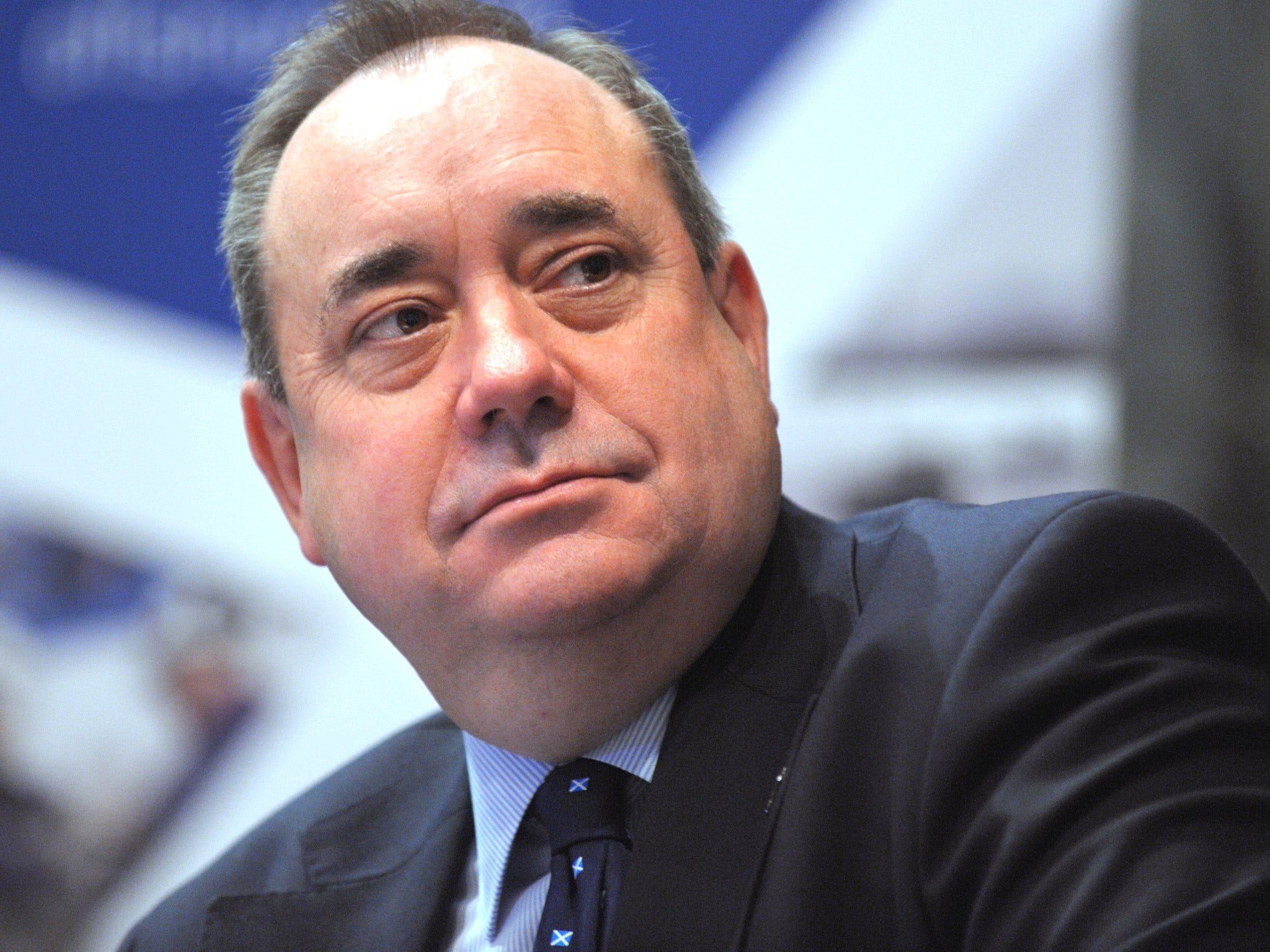Your support helps us to tell the story
From reproductive rights to climate change to Big Tech, The Independent is on the ground when the story is developing. Whether it's investigating the financials of Elon Musk's pro-Trump PAC or producing our latest documentary, 'The A Word', which shines a light on the American women fighting for reproductive rights, we know how important it is to parse out the facts from the messaging.
At such a critical moment in US history, we need reporters on the ground. Your donation allows us to keep sending journalists to speak to both sides of the story.
The Independent is trusted by Americans across the entire political spectrum. And unlike many other quality news outlets, we choose not to lock Americans out of our reporting and analysis with paywalls. We believe quality journalism should be available to everyone, paid for by those who can afford it.
Your support makes all the difference.Alex Salmond has accused George Osborne of “trying to scare people in Scotland” after the Chancellor seized on a report by the Treasury which warned it may not be viable for the country to keep the pound if it votes for independence.
The Scottish First Minister has proposed that an independent Scotland should carry on using sterling, with the Bank of England continuing to set interest rates and acting as a lender of last resort for the new nation’s banks.
But the Treasury report, prepared by politically impartial civil servants, said the economic case for creating a “sterling zone” was not clear cut and cautioned that a continued currency union post-independence could run the risk of financial instability of the sort that presently afflicts the eurozone.
“The recent experience of the euro area has shown it is extremely challenging to sustain a successful formal currency union without close fiscal integration and common arrangements for the resolution of banking sector difficulties” it said.
It suggested that an independent Scotland would have four options for its currency: continuing to use the pound as part of a formal agreement with the rest of the UK; continuing to use the pound unilaterally with no such deal in place; joining the euro; or introducing a new Scottish currency.
Mr Osborne immediately took to the airwaves to warn Scottish voters that there is no guarantee they would be able to keep sterling if they voted for independence next year.
“I think it’s unlikely that the rest of the United Kingdom would agree to or could make work a euro-style currency zone with Scotland,” the Chancellor told the BBC. “If Scotland wants to keep the pound, the best way they could do that would be to stay in the United Kingdom”.
Speaking in Glasgow, Mr Osborne also said that a new government in Edinburgh might be required to run its budget plans past the UK Government for approval as the price of keeping sterling. He asked: “Would a newly independent Scottish state be prepared to accept significant limits on its economic sovereignty, to submit its economic plans to Westminster before Holyrood?”
However, Mr Salmond dismissed this as “political sabre-rattling”, adding: “This is a Tory Chancellor trying to scare people in Scotland, trying to stop them voting for independence.” He continued: “It’s in everyone’s interests to have a currency area after independence – it’s in the interests of Scotland, it’s also overwhelmingly in the interest of the rest of the United Kingdom.”
Chief Secretary to the Treasury Danny Alexander, who also addressed the gathering in Glasgow, argued that the current currency arrangements are the best for Scotland. “If you want to keep the pound, keeping the United Kingdom is the best way to do it,” he said.
Money, money, money: The currency debate
Join a ‘sterling zone’
The preferred option of the Scottish nationalists, but would require agreement from the rest of the UK. The Scottish economy is well integrated with the rest of the UK, so there could be mutual benefits – but also the curtailment of Scottish economic independence by Westminster as the quid pro quo. The Bank of England would be standing by as an emergency lender to Scottish banks and would require regulatory oversight.
Likelihood 4/5
Unilateral use of sterling
Scots carry on using the pound informally in the same way that some small South American nations use the US dollar. Would minimise initial disruption for Scottish businesses and residents, but would leave Scotland with no control over its interest rates, which could be very painful in a Scottish downturn.
Likelihood 1/5
Launch a new currency
Given the large share of Scottish GDP is linked to the North Sea oil industry, a standalone currency would probably be volatile, like a petro currency. Spikes in value would be very painful for Scottish manufacturers. Volatility could also disrupt trade links with the rest of the UK, the destination of a third of Scottish output. Scots would also have to change money every time they travelled to England.
Likelihood 1/5
Join the euro
Potential danger for Scotland in the single currency lies in the present difficulties of Ireland, Cyprus and Portugal: monetary policy is being set for the core countries, rather than those at the periphery. Those nations have also had to surrender some of their economic sovereignty to Brussels after budget deficits got out of control.
Likelihood 2/5

Join our commenting forum
Join thought-provoking conversations, follow other Independent readers and see their replies
Comments